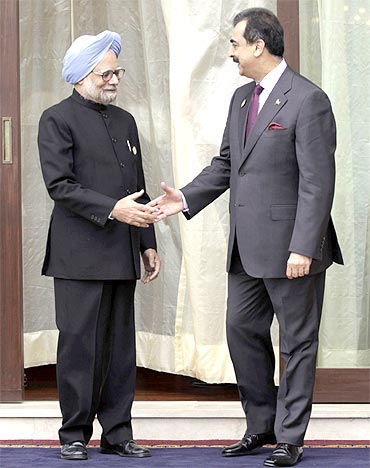 Prime Minister Manmohan Singh and his Pakistani counterpart Yousaf Raza Gilani on Thursday held a delegation-level meeting at the neutral venue of Bhutan House in Thimphu, on the sidelines of the South Asian Association for Regional Cooperation summit. The meeting lasted for 50 minutes.
Prime Minister Manmohan Singh and his Pakistani counterpart Yousaf Raza Gilani on Thursday held a delegation-level meeting at the neutral venue of Bhutan House in Thimphu, on the sidelines of the South Asian Association for Regional Cooperation summit. The meeting lasted for 50 minutes.
A lot of excitement is generated whenever the governments of India and Pakistan hold talks, as a result of pre-summit exchanges of expectations, spins and charges.
The Indian administration recently arrested Madhuri Gupta, a staffer at the Indian High Commission is Islamabad, on charges of passing on information to Pakistani intelligence agencies. Gupta's arrest created a flutter that the proposed talks will now be doomed. The arrest was seen as India's message to Pakistan about the serious issue of 'national security'.
Then came loud statements from Pakistan's side -- that both PMs should pick up a thread from Sharam-el-Sheikh (in Egypt, where they had met in July last year). This was an irritant to provoke a constituency in India, who had taken strongest objection to the inclusion of Baluchistan in the final joint statement issued by Dr Singh and Gilani after that meeting.
However, since Parliament is in session in India and Pakistan is in the middle of far-reaching changes within its power structure, the talks at Thimpu have not been 'sold' by the Indian side in the Indian media.
Earlier reports indicated that there won't be any joint statement, the dialogue was not structured and the meeting was arranged with limited issues, say sources in the Indian side.
Pakistan not only wanted the composite dialogue to start, it also wanted to give 'evidence' of India's presence in Baluchistan. Both sides have made tough postures before the summit.
But, in case of India and Pakistan, whenever there is great grandstanding before talks, it means there is something substantial going on behind closed doors.
Imtiyaz Alam, a veteran journalist from Pakistan, told rediff.com, "Both countries are back to square one after the 26/11 attacks in Mumbai . So, opening the communication at the highest level is always good."
The pressure to not lose any ground is so high on both sides that diplomats and political leaders have to literally steal the time and opportunity to talk to each other.
In the privacy of SAARC village, according to unconfirmed reports, the two PMs took a brief walk and talked, while enjoying the open air of this green town.
National Security Advisor Shiv Shankar Menon and Pakistan's High Commissioner in India Shahid Malik grabbed some 20 minutes on the same day inside the Grand Hall to exchange views, before the arrival of the heads of states of SAARC nations.
Malik took down some notes and both exchanged numbers on their Blackberry phones. This was India and Pakistan's style of 'unstructured talks' conducted without hype.
It is obvious that India and Pakistan are ready to talk to each other. India wanted a small gesture from Pakistan so that Dr Singh can walk a mile while Pakistan found itself in a stronger position because of the realities of Afghanistan, where it is a major player.
Alam says track two talks are also on between the two countries. Congress President Sonia Gandhi, not Dr Singh, is the real power centre in the government, he believes.
The issue is how to frame the intentions of the Indian and Pakistani establishment in words that would sell in both countries. Pakistan has slighted Dr Singh by saying that he has a vision for bilateral talks but his party, the Congress, is reluctant to hold a dialogue.
A senior Indian diplomat says, "Pakistan can't divide the Congress and Dr Singh because both he and Sonia Gandhi are democratic leaders. Pakistan army chief Ashfaq Parvez Kayani is not a democratically elected leader. India believes strongly that current leaders of Pakistan may be democratically elected but even now General Kayani is calling the shots. There is a limit attached to the powers of Gilani."
However, once again the two adversaries have met and no one can dispute that 'communication is power' in such circumstances.
Meanwhile, US Assistant Secretary of State Robert Blake has expressed hope that the outcome of the talks will be positive.
Blake is attending the summit as the United States enjoys the status of an observer in SAARC.
In view of mixed signals before the talks from both sides, and in a predictable way, the stances on various issues have been hardened.
There is a view that the meeting will produce some results. It is expected that new terminology will be used to move forward in bilateral relations.
Watch this space for more spin and news over the talks in Thimphu.
Image: Prime Minister Manmohan Singh with Pakistan Prime Minister Yusuf Raza Gilani at the 16th summit of the SAARC in Thimphu | Photograph: Rupak De Chowdhuri/Reuters





